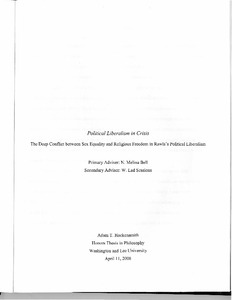| dc.rights.license | In Copyright | en_US |
| dc.creator | Hockensmith, Adam Tyler | |
| dc.date.accessioned | 2023-10-20T18:00:45Z | |
| dc.date.available | 2023-10-20T18:00:45Z | |
| dc.date.created | 2008 | |
| dc.identifier | WLURG038_Hockensmith_thesis_2008 | |
| dc.identifier.uri | https://dspace.wlu.edu/handle/11021/36443 | |
| dc.description.abstract | In "Political Liberalism, Justice, and Gender," Susan Moller Okin criticizes the account of the family presented in John Rawls's Political Liberalism. As I see it, Okin levels two distinct
charges against Rawls. [1] First, she argues that his dual classification of the family as part of the basic structure of society and as a nonpolitical association is internally inconsistent. Second, she argues that he unjustifiably extends his criterion of reasonableness to patriarchal religious sects whose members aim to educate their children with beliefs that conflict with sex equality. [2] Okin's second criticism appears particularly damaging to Rawls's conception of political liberalism because sex inequality violates the principles of justice as fairness, [3] which according to Rawls is the most appropriate conception of justice for a well-ordered society.[4] Largely in response to Okin's criticisms, Rawls devotes a section of "The Idea of Public
Reason Revisited" to refining his conception of the family as part of the basic structure of society. His essay addresses Okin's first criticism by asserting that no domain of life exists
outside the reach of justice: hence, the family is regulated by the two principles of justice as fairness. On Rawls's revised account, a state must ensure that the internal affairs of the family do not violate the rights of persons qua citizens or inculcate "habits of thought and ways of feeling and conduct incompatible with democracy" in order to satisfy the demands of justice as fairness (Rawls 1999b, 160). This requirement entails that a just state must prohibit any practices that deprive women .of their rights as democratic citizens or perpetuate sex inequality. At odds with this requirement is Rawls' s belief that most mainstream religions, excluding fundamentalist sects, are reasonable religious doctrines (Okin 1994, 31 ). As a matter of principle, many reasonable mainstream religions promote the gender-structured family, an institution that, Okin believes, conflicts with sex equality. [5] If parents wish to indoctrinate their daughter with religious views that compromise her political liberties as a future citizen, then justice as fairness requires law to prohibit this practice. [2] Okin' s second criticism raises an important question: Can justice as fairness tolerate all reasonable comprehensive doctrines in the background culture of a liberal democracy? I believe that the viability of Rawlsian political liberalism depends on there being a positive answer to this question. Because Rawls wishes to situate justice as fairness at the core of his political liberalism, a negative answer to this question would indicate that a liberal democratic society marked by reasonable pluralism could not be both just and stable. [6] It would suggest a problematic tension between justice and stability in Raw ls' s theory. If such a tension exists and is not resolvable in a manner consistent with both Rawls's assumptions about a well-ordered society and the aims of liberalism, then his notion of political liberalism is unrealistically utopian. This paper aims to show that a positive answer to this question does not exist, that there is no way to resolve the resulting tension, and that Rawls's political project fails. [From Introduction] | en_US |
| dc.format.extent | 60 pages | en_US |
| dc.language.iso | en_US | en_US |
| dc.rights | This material is made available for use in research, teaching, and private study, pursuant to U.S. Copyright law. The user assumes full responsibility for any use of the materials, including but not limited to, infringement of copyright and publication rights of reproduced materials. Any materials used should be fully credited with the source. | en_US |
| dc.rights.uri | http://rightsstatements.org/vocab/InC/1.0/ | en_US |
| dc.subject.other | Washington and Lee University -- Honors in Philosophy | en_US |
| dc.title | Political Liberalism in Crisis: The Deep Conflict Between Sex Equality and Religious Freedom in Rawls's Political Liberalism | en_US |
| dc.type | Text | en_US |
| dcterms.isPartOf | WLURG038 - Student Papers | en_US |
| dc.rights.holder | Hockensmith, Adam Tyler | en_US |
| dc.subject.fast | Theory of justice (Rawls, John) | en_US |
| dc.subject.fast | Liberalism | en_US |
| dc.subject.fast | Social justice -- Religious aspects | en_US |
| dc.subject.fast | Sex discrimination | en_US |
| local.department | Philosophy | en_US |
